World Spirituality Unplugged: “What’s love got to do with business?: John Mackey and Marc Gafni in Dialogue, Part 1”
 World Spirituality Unplugged is a regular new column on this website which will feature highlights from the Center for World Spirituality’s substantial audio and video archives which are more relevant than ever before. The short clip posted here (about 5 minutes) features an excerpt from a dialogue between John Mackey and Marc Gafni, recorded in 2010 for the Future of Love Teleseries, an online event for which CWS was a co-sponsor.
World Spirituality Unplugged is a regular new column on this website which will feature highlights from the Center for World Spirituality’s substantial audio and video archives which are more relevant than ever before. The short clip posted here (about 5 minutes) features an excerpt from a dialogue between John Mackey and Marc Gafni, recorded in 2010 for the Future of Love Teleseries, an online event for which CWS was a co-sponsor.
Marc Gafni, as you are well aware, is the Director and Scholar-in-Residence for the Center. John Mackey is not only the Chairman and CEO of a $4 billion Fortune 500 company, he is also Co-Chair of the Board of the Center for World Spirituality. Mackey was named the Ernst and Young Entrepreneur Of The Year in 2003. John is a strong believer in FLOW principles, including free market principles and empowerment management. He is also one of the most influential advocates in the movement for organic food. Whole Foods was the first grocery chain to set standards for humane animal treatment.
Early in the dialogue, John Mackey offers a definition of business that situates it right at the heart of human care and concern:
Marc: As we talk about love today, we’re talking about it not from a Christian perspective, or from a Jewish perspective, or from a Muslim perspective, or a Buddhist, or a Taoist, or a Native American, we’re talking about a perspective which transcends and includes them. And by “transcend,” I mean trance-end. We end the trance of one particular understanding, we receive what’s best and deepest in it, and link it with an understanding of the understandings available all over the globe and history, in a way that was never really available before. That’s the context that we’re talking about. We’re not going to be referring to it any more today. In that context, from that place, we’re talking about love and business, love and commerce, love and capitalism.
When the average person walks down the street and thinks about love and then they think about business, they think what do those things have to do with each other. Business: isn’t that about making profit? Love: that’s that spirit feeling that I have that’s all about sacrifice, things that have little to do with the material. We got a few emails from people saying: Love and Business? What’s that about? We wrote back: Tune in and listen and find out.
It’s delightful to be with you. What would your response be to those people? How does love actually act and show up in 1st, 2nd, and 3rd person? 1st – love that you feel moving through you; 2nd – interpersonal love, love in the space of the We; 3rd – love as the force of the universe. How does that show up in the world of commerce and business. John, be our teacher.
John: Okay, Marc. It’s sort of an odd question: what does love have to do with business? There’s sort of an assumption that business and commerce and capitalism are not fully human activities. That they are held apart in some way. That’s part of the problem. We have this stereotype of business based on metaphors of greed and selfishness based on this belief that it’s all about profit and money, and therefore it’s less than human. If that’s really what business is, then I think people would be right to condemn it. But that’s not been my experience with business. Business is as much a human activity as anything else. Human are engaging in it. Love is appropriate in business. In fact, love is essential in business if it’s going to reach its full potential.
Marc: Say more about that, John. You’re saying that love lives in business. Love is one of the natural human activities, so this split is a false split. From your own personal experience or from a meta-frame, how does love show up as a force or deep factor as you do business?
John: The first thing to understand is that business is almost always done as community, meaning a business or company is a group of people that are working together. They are working together to create value for other people. In fact, the very essence of what business is is voluntary exchange creating value for other people. That’s not only ethical, but when you go down to the roots it is a profoundly loving act – it can be and should be. We create about other people, and we’re cooperating in order to create value for them. I see business as fundamentally based on voluntary exchange between people for mutual benefit. A company has employees that work together, creating value for customers. Customers exchange voluntarily for a business. That exchange creates value for the suppliers that are exchanging with the business, which creates value for investors. The whole activity of commerce, when you move away from the caricature, you discover that at its root it is people in community creating value for each other. That can be and should be a profound act of love, care, and compassion.
Marc: What a gorgeous definition of business!
Listen to the whole audio for Part 1.

 There is a tale that educators love about the girl who paints a purple tree. The teacher, who has drawn a tree on the board and asked the children to copy it, is disapproving. “You didn’t copy my tree.”
There is a tale that educators love about the girl who paints a purple tree. The teacher, who has drawn a tree on the board and asked the children to copy it, is disapproving. “You didn’t copy my tree.” As these words are written, Malala Yousafzai is in critical condition in a hospital. The girl, now 14 years old, came to fame when the world learned she was the pseudonymous BBC blogger who advocated for girls’ education and criticized the atrocities of Islamic extremists in her city. She has been a contender for a prestigious international peace prize for children. Yesterday, on the eve of the
As these words are written, Malala Yousafzai is in critical condition in a hospital. The girl, now 14 years old, came to fame when the world learned she was the pseudonymous BBC blogger who advocated for girls’ education and criticized the atrocities of Islamic extremists in her city. She has been a contender for a prestigious international peace prize for children. Yesterday, on the eve of the 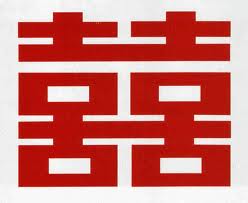 In the teaching of Unique Self, the whole/part, autonomy/communion paradox is finally clarified. The Unique Self teaching allows us to create right relationship between whole and part, autonomy and communion. This right relationship is the absolute key to joy, creativity, meaning and peace.
In the teaching of Unique Self, the whole/part, autonomy/communion paradox is finally clarified. The Unique Self teaching allows us to create right relationship between whole and part, autonomy and communion. This right relationship is the absolute key to joy, creativity, meaning and peace. By Marc Gafni
By Marc Gafni
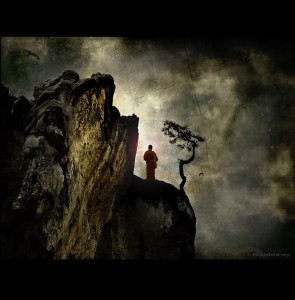 World Spirituality is not only about coping with life, but about transforming it through mystical realization.
World Spirituality is not only about coping with life, but about transforming it through mystical realization.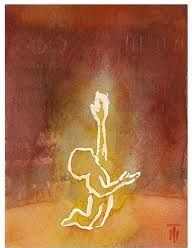 On MarcGafni.com, a new quote from Dr.
On MarcGafni.com, a new quote from Dr.  In a series of books (e.g., A Sociable God, Up from Eden, and The Eye of Spirit), I have tried to show that religion itself has always performed two very important, but very different, functions. One, it acts as a way of creating meaning for the separate self: it offers myths and stories and tales and narratives and rituals and revivals that, taken together, help the separate self make sense of, and endure, the slings and arrows of outrageous fortune. This function of religion does not usually or necessarily change the level of consciousness in a person; it does not deliver radical transformation. Nor does it deliver a shattering liberation from the separate self altogether. Rather, it consoles the self, fortifies the self, defends the self, promotes the self. As long as the separate self believes the myths, performs the rituals, mouths the prayers, or embraces the dogma, then the self, it is fervently believed, will be “saved”–either now in the glory of being God-saved or Goddess-favored, or in an after-life that insures eternal wonderment.
In a series of books (e.g., A Sociable God, Up from Eden, and The Eye of Spirit), I have tried to show that religion itself has always performed two very important, but very different, functions. One, it acts as a way of creating meaning for the separate self: it offers myths and stories and tales and narratives and rituals and revivals that, taken together, help the separate self make sense of, and endure, the slings and arrows of outrageous fortune. This function of religion does not usually or necessarily change the level of consciousness in a person; it does not deliver radical transformation. Nor does it deliver a shattering liberation from the separate self altogether. Rather, it consoles the self, fortifies the self, defends the self, promotes the self. As long as the separate self believes the myths, performs the rituals, mouths the prayers, or embraces the dogma, then the self, it is fervently believed, will be “saved”–either now in the glory of being God-saved or Goddess-favored, or in an after-life that insures eternal wonderment. In
In 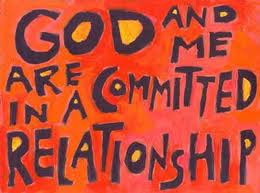 Remember Master Menachem Mendel who was asked by his students, “Rebbe (teacher), where is God?”
Remember Master Menachem Mendel who was asked by his students, “Rebbe (teacher), where is God?” The world over, God’s name is evoked in greetings. The Spanish hello – “Olah” – originated in Arab Spain from the term “O’Allah” – Allah of course being the Arab appellation of God. In Bavarian German they say “Gruss God”. In Hebrew, the common response when asked how you are doing is “Baruch Hashem” – Praise God, or Thank God. The Hebrew greeting “Shalom” is actually a name of God. In English, we still follow this custom when we part from someone and say “God speed” or “God be with you.”
The world over, God’s name is evoked in greetings. The Spanish hello – “Olah” – originated in Arab Spain from the term “O’Allah” – Allah of course being the Arab appellation of God. In Bavarian German they say “Gruss God”. In Hebrew, the common response when asked how you are doing is “Baruch Hashem” – Praise God, or Thank God. The Hebrew greeting “Shalom” is actually a name of God. In English, we still follow this custom when we part from someone and say “God speed” or “God be with you.” God responds to the crying of Ishmael and not the crying of Hagar. Ishmael represents the crying of the baby with which all life begins. Why does the baby cry? The baby is hungry, the baby is afraid, the baby is vulnerable, the baby is lonely. The baby’s cry is a primal scream of protest. The shofar on Rosh Hashana is called by the talmud “Yeulelei Yallil,” the howling of the wolf. It is a kind of intuitive shriek, a pre-personal crying expressing a feeling of threat and a deep need for protection. It is motivated at least in part by fear.
God responds to the crying of Ishmael and not the crying of Hagar. Ishmael represents the crying of the baby with which all life begins. Why does the baby cry? The baby is hungry, the baby is afraid, the baby is vulnerable, the baby is lonely. The baby’s cry is a primal scream of protest. The shofar on Rosh Hashana is called by the talmud “Yeulelei Yallil,” the howling of the wolf. It is a kind of intuitive shriek, a pre-personal crying expressing a feeling of threat and a deep need for protection. It is motivated at least in part by fear. In order to identify our unique selves (in theistic terms – soul prints) and to respond to the voices that call us to meaning we need to first experience the world as meaningful. One of the great cries of modernity is that it all seems to be a house of mirrors. The image of the house of mirrors indicates our feeling that there is no core essence in the world; rather all is a grand joke, an illusion, a house of mirrors in a cruel carnival. Life too often seems absurd. Nothing really matters. Absurdus’ means “fully deaf” in Latin. So often we moderns, strain mightily and often vainly, to hear the call or sense the innate purpose of being.
In order to identify our unique selves (in theistic terms – soul prints) and to respond to the voices that call us to meaning we need to first experience the world as meaningful. One of the great cries of modernity is that it all seems to be a house of mirrors. The image of the house of mirrors indicates our feeling that there is no core essence in the world; rather all is a grand joke, an illusion, a house of mirrors in a cruel carnival. Life too often seems absurd. Nothing really matters. Absurdus’ means “fully deaf” in Latin. So often we moderns, strain mightily and often vainly, to hear the call or sense the innate purpose of being.
 So far, the two major qualities of the erotic lover have been perception and giving. We have seen how the sexual models the erotic, hinting to us how we can live a deeper, more profound existence in all areas of our lives. In order to give in the realm of the sexual, we must be great listeners – fully attentive to the subtlest nuances of our lover’s desire. Similarly, to be a giver in all arenas of being requires our mastering the lover’s art of attention.
So far, the two major qualities of the erotic lover have been perception and giving. We have seen how the sexual models the erotic, hinting to us how we can live a deeper, more profound existence in all areas of our lives. In order to give in the realm of the sexual, we must be great listeners – fully attentive to the subtlest nuances of our lover’s desire. Similarly, to be a giver in all arenas of being requires our mastering the lover’s art of attention. Love doesn’t just sit there, like a stone, it has to be made, like bread; remade all the time, made new. ”” Ursula K. LeGuin, The Lathe of Heaven
Love doesn’t just sit there, like a stone, it has to be made, like bread; remade all the time, made new. ”” Ursula K. LeGuin, The Lathe of Heaven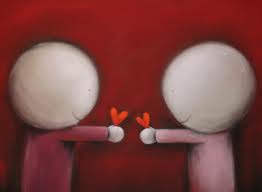 To be a lover is to be a giver. It is through the consistent commitment to the growth of the other expressed through regular and spontaneous acts of giving that you become a lover.
To be a lover is to be a giver. It is through the consistent commitment to the growth of the other expressed through regular and spontaneous acts of giving that you become a lover.
 The perception of falling in love is but one expression, however of a broader kind, of perception. This higher way of seeing is the path of Ecstasy. Ecstasy, from the Greek word ex-stasis, means “to move beyond stasis,” that is “beyond the apparently solid, into motion, movement, and life itself.” Its Latin root ex-stare means to stand outside yourself. To say I’m ecstatic is to say “I am beside myself. I am overwhelmed by intense experience. The veils of my illusions have been pierced and something essential touched.”
The perception of falling in love is but one expression, however of a broader kind, of perception. This higher way of seeing is the path of Ecstasy. Ecstasy, from the Greek word ex-stasis, means “to move beyond stasis,” that is “beyond the apparently solid, into motion, movement, and life itself.” Its Latin root ex-stare means to stand outside yourself. To say I’m ecstatic is to say “I am beside myself. I am overwhelmed by intense experience. The veils of my illusions have been pierced and something essential touched.”